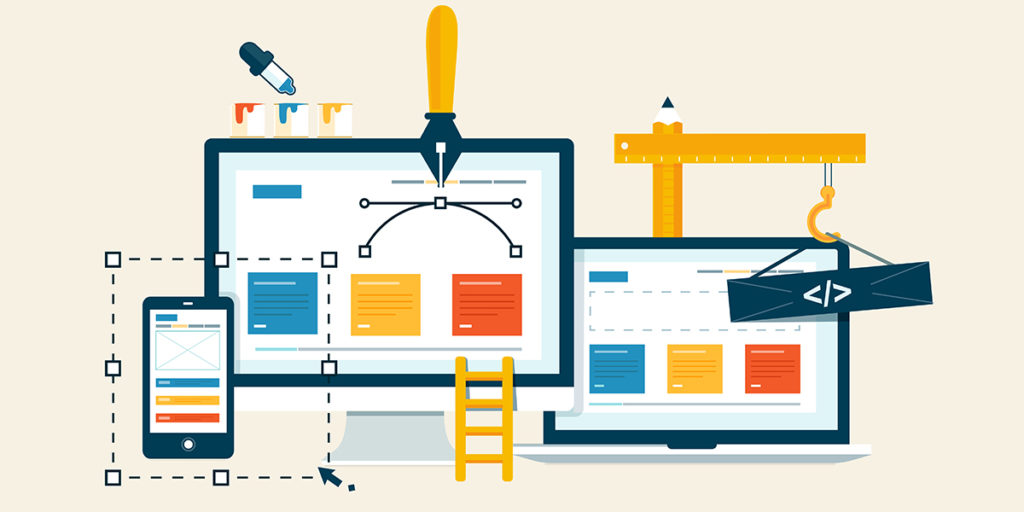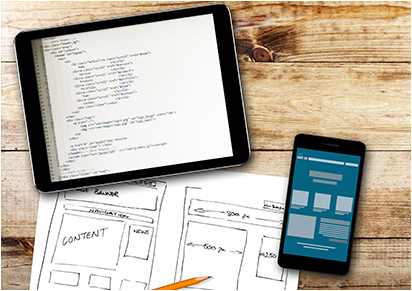
The most frequent misconception about business websites is that they must provide services or goods for sale, or conduct online financial transactions. This isn’t accurate. Although e-commerce websites have grown in popularity recently, the majority of companies still maintain information and communication-oriented websites. If your company plans to sell online, you should certainly consider creating ecommerce website however, if it’s not, you’ll still want one.
As an entrepreneur, you want your website to act as your digital storefront on the web, directly representing your brand and illustrating what makes it different from competitors. It’s about marketing yourself digitally without necessarily selling anything. Your goal is to provide valuable information that builds trust with customers and gains
Building your own website can be intimidating. There are so many things to consider before you get started, and the list goes on. From what type of design should I use to how do I set up my site? The following 10 points will help guide you through the process.
1 – Create a plan

Before you even think of setting up your site, you need to make sure you have a plan. Don’t leave things to chance and don’t go and build random pages (such as an about page) haphazardly without first having some structure. Before you do anything, consider the following:
- Who is my target audience?
- What do I want them to do once they’re on the site (i.e. call for a quote)?
- Where will I be hosting my site?
- How much time can I dedicate to maintaining and updating my website?
2 – Choose your domain name wisely
Your domain name plays an instrumental role in the success of your website, so choose wisely! It’s often said that “If you fail to plan, you plan to fail,” and this couldn’t be more true when it comes time to choosing a domain name. So what should you do?
Be specific – rather than general. Simply typing ‘coupons’ into Google yields over 26 million results. Choosing a specific niche will cut down on your competition and help you rank higher in search engines.
3 – Choose a design that suits your brand

It’s important to choose a design that aligns with your brand. If you run a luxury restaurant, it doesn’t make sense for you to have a “funky homemade” website. Customers want their expectations met when they visit your site, so give them something that is professional and reflects your company image/branding.
On the other hand, don’t feel the need to go over the top with your design either. If you’re a small business, doing something simple is often better than spending money on something that doesn’t match your company image or brand.
4 – Stay organized
As you start building your website, stay organized! Keeping tabs on everything can be very time-consuming. Consider creating a spreadsheet with the following columns:
- Website page name (you’ll need this for updating)
- Notes (for organizing your thoughts/ideas)
- The order you plan to build them in (so that you don’t get confused)
- How much time it takes to create one of each (so that you can budget properly)
While you might be tempted to try and create your own website, many say that it’s a better idea to hire a web design company in India. Web designers know what they’re doing when it comes to building websites. They have experience in this area, so they’ll likely do a better job than you would.
5 – Use a reputable hosting company
When choosing a host for your site, it’s important that you choose one that is reputable and reliable. If you choose to go with a cheap server for hosting, the chances of your website crashing increase dramatically. And not only will this affect your business image online but it can also lead to financial losses.
What’s more, many hosting companies offer packages that boast unlimited data transfer and disk space. This is important because as you grow, your website will need to scale with you – Unlimited resources means your website won’t crash when it gets too busy!
6 – Use Content Wisely

It’s no secret that Google loves quality content, so you’ll want to use your website to the best of your ability. The truth is, most business owners don’t realize how valuable their knowledge really is. Every entrepreneur has unique experiences and insight into their industry, which can be used to create some truly compelling and useful content on your website.
Rather than simply publishing a “top 10 list,” try and offer unique advice and tips based on your own experiences. Don’t be afraid to get creative! If you’re more comfortable writing, then write an article or create a blog post that will benefit others in your niche. After all, it’s not about you, it’s about your customers. And the more helpful information you provide them with, the better!
7 – Don’t forget about mobile
Did you know that Google is currently rolling out an update called “Mobilegeddon?” This update will only serve to increase the importance of having a responsive website that will work on any device. If your site isn’t optimized for both mobile and tablet devices, you might see a drop in your search engine rankings.
A web design agency can help you create a mobile-friendly site, so don’t worry if your current business website isn’t optimized for mobile. The chances are very good that one of these agencies can fix it!
8 – Don’t obsess over SEO

Many new entrepreneurs get ahead of themselves when it comes to search engine optimization (SEO) and take it too far. SEO is important when you’re trying to get your site noticed, but don’t waste time or money on things like link building if it doesn’t fit in with your current marketing plan. Remember, the ultimate goal of SEO for your business website is to make sales!
9 – Monitor your website statistics

Statistics are important to every business owner because they allow you to find out what’s working with your site and what needs improvement. To get started, consider installing a Google Analytics plugin on your blog or website.
This tool will allow you to view daily, monthly and yearly traffic data.
You’ll be able to find out where your visitors are coming from (which search engines, which keywords) and also get a good idea of the specific pages they’re visiting on your site (so you know which ones need improvement).
10 – Update your website regularly
Finally, your website should be updated on a regular basis. If you’ve got a content management system (CMS) installed, such as WordPress or Drupal, then you can update it using the backend control panel whenever you like. Don’t forget to keep your pages fresh and up-to-date with new information; this will help your SEO rankings and also keep visitors interested in your business.
An updated website is a sign of professionalism, so always remember to put it on top of the list when you need to create or update any marketing collateral for your small business.
If you’re looking for the best web design company in India, you can contact us anytime. We’ll be more than happy to help you with all of your website design and digital marketing needs.

